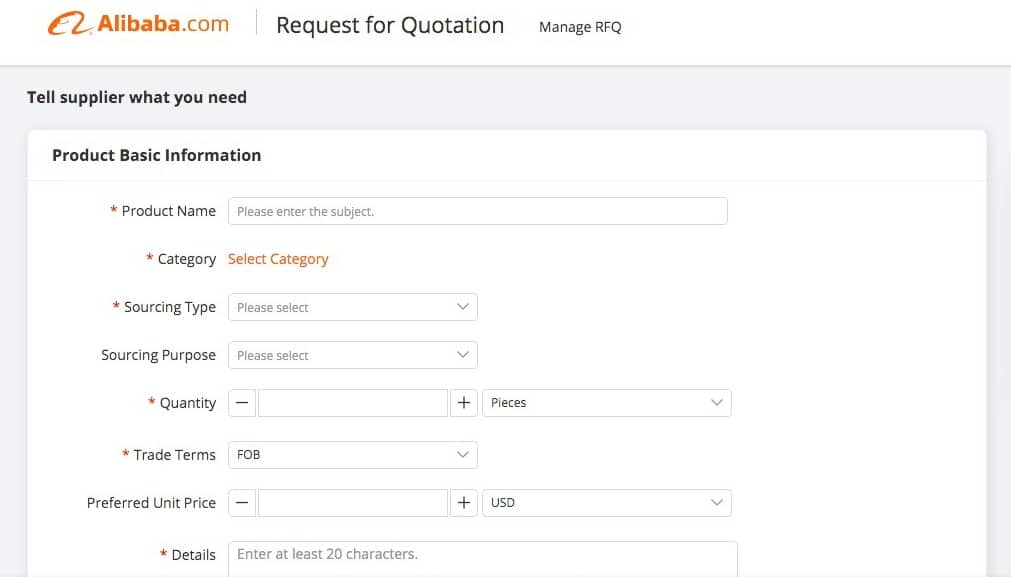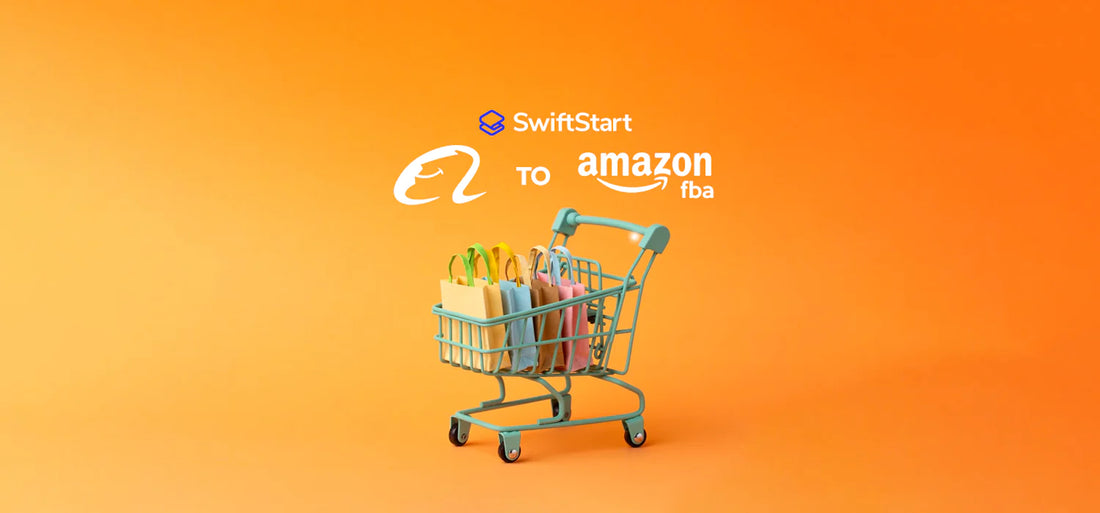If you're looking to start an online business, selling on Amazon can be a lucrative option. With over 300 million active customers, Amazon is the largest online retailer in the world. But where do you start? One popular approach is sourcing products from Alibaba and using Amazon's FBA (Fulfillment by Amazon) service to handle storage, shipping, and customer service.
Looking for An Amazon Expert? Click Here!
In fact, according to Marketplace Pulse, over 60% of the top Amazon sellers use Alibaba to source their products. In this step-by-step guide, we'll walk you through the process of going from Alibaba to Amazon FBA, providing you with valuable insights, facts, and figures along the way. So, whether you're an experienced entrepreneur or just starting out, read on to learn how to successfully sell on Amazon using Alibaba.
What's in the Guide?
In this Alibaba to Amazon FBA guide, we will discuss the following:
- What is Alibaba?
- Benefits and risks associated with using Alibaba for selling on Amazon
- Is it safe to buy from Alibaba and sell to Amazon FBA?
- How does Alibaba help third-party sellers?
- How to buy from Alibaba and sell on Amazon FBA?
- How to ship from Alibaba to Amazon FBA step-by-step Process
What is Alibaba?

Alibaba is a Chinese e-commerce company that connects buyers and sellers worldwide. It is a popular platform for finding suppliers and sourcing products for businesses of all sizes. Alibaba provides a vast range of products, from electronics to fashion to home goods, at competitive prices.
One of the main benefits of using Alibaba for product sourcing is the wide range of products and suppliers available. With over 10 million registered buyers and 190,000 suppliers, there's a good chance you'll be able to find the products you need at competitive prices. Alibaba also offers easy communication with suppliers through its messaging system and buyer protection features, such as Trade Assurance, which helps protect your payments and products.
While Alibaba is a great source of products for Amazon sellers, it's important to note that there are risks involved with buying from suppliers on the platform. For example, the quality of products can be unpredictable, and some suppliers may not meet Amazon's standards for product sourcing and quality control. It's essential to exercise caution and perform due diligence when sourcing products on Alibaba.
Is it Safe to Buy from Alibaba and Sell to Amazon FBA?

As we mentioned earlier, buying from Alibaba can be risky if you don't take the proper precautions. To mitigate these risks, it's important to thoroughly research suppliers and verify their credentials before making a purchase. Look for suppliers with high ratings and positive reviews verified by Alibaba. Additionally, it's important to thoroughly inspect and test products before sending them to Amazon FBA for storage and fulfillment.
Amazon FBA has strict policies for product sourcing and quality control, and failing to comply with these policies can result in the suspension or termination of your seller account. For this reason, it's important to ensure that the products you source from Alibaba meet Amazon's requirements. In general, Amazon requires products to be new, genuine, and in their original packaging. It's also important to ensure that the products meet all legal requirements and regulations.
How does Alibaba Help Third-Party Sellers?

Alibaba is an excellent resource for third-party sellers looking to source products for Amazon FBA. The platform provides various services and tools to help businesses find and evaluate suppliers. Some of the benefits of using Alibaba for Amazon sourcing include:
- Wide selection of products: Alibaba provides a vast selection of products at competitive prices, making it easy to find the right products to sell on Amazon.
- Customized sourcing: Alibaba's advanced search tools and filters allow sellers to find suppliers that meet their specific needs and requirements.
- Negotiation tools: Alibaba provides a platform for negotiating prices and terms with suppliers, making it easier to get a good deal.
- Verification and inspection services: Alibaba offers a range of verification and inspection services to help sellers ensure the quality and authenticity of the products they source.
Overall, Alibaba is an excellent resource for third-party sellers looking to source products for Amazon FBA.
How to Buy from Alibaba and Sell on Amazon FBA?
Here is a step-by-step guide for sourcing products from Alibaba and selling them on Amazon FBA:

Finding a Product Idea
Before you can start selling on Amazon using Alibaba, you need to find a profitable product idea. This requires niche research and analysis, product demand and competition research, trends, and forecasting. There are several tools and resources available to help with this process, such as Jungle ScoutJungle Scout and Helium 10.

Pricing Strategy
Once you've found a product idea, the next step is to determine your pricing strategy. This includes calculating your costs and profits, factoring in shipping and handling fees, and analyzing the competition to ensure you're pricing competitively. It's important to keep in mind that pricing is a key factor in sales, so finding the right balance between profit and affordability is crucial.
Intellectual Property Rights
Protecting your intellectual property is essential when selling on Amazon using Alibaba. This includes avoiding infringing on other brands' IPs and taking steps to protect your own IP. Alibaba has several tools and resources available to help with this, such as its Intellectual Property Protection platform and Verified Rights Owner (VeRO) program.
Product Safety
Ensuring your products are safe and comply with legal requirements is crucial to avoid legal issues and protect your customers. This includes quality control measures, such as testing and certification, and following legal requirements for product safety, such as those outlined by the Consumer Product Safety Commission.
Finding the Best Manufacturers on Alibaba
Finding the right supplier is crucial to the success of your Amazon business. When evaluating suppliers on Alibaba, it's important to consider factors such as their product quality, communication skills, and reputation. Alibaba's search and filtering features can help narrow down potential suppliers, and it's also a good idea to ask for references and read reviews from other buyers.

Getting Quotes
Once you've identified potential suppliers, the next step is to request quotes and negotiate prices and quantities. It's important to obtain multiple quotes from different suppliers to ensure you're getting a fair price. Alibaba's messaging system makes communicating with suppliers and requesting quotes easy. You can also use Alibaba's RFQ (Request for Quotation) service to simultaneously receive quotes from multiple suppliers. When negotiating prices and quantities, it's important to be clear and concise about your expectations and requirements and to negotiate in good faith.
Ordering Product Samples
Before placing a large order with a supplier, it's a good idea to order product samples to ensure the product quality and suitability for your needs. Many suppliers on Alibaba offer free or low-cost samples, and it's important to test the product thoroughly and provide feedback to the supplier to ensure any issues are addressed before placing a larger order.

Inspecting Products
To ensure the products you receive are of the expected quality, it's important to inspect them before shipping them to Amazon's FBA warehouses. This can be done either by visiting the supplier in person or by hiring a third-party inspection company. Alibaba also offers an inspection service, Alibaba Inspection Service, that provides on-site inspections and quality control checks.
Labeling and Packaging
Proper labeling and packaging are essential when selling on Amazon using Alibaba. This includes complying with Amazon's packaging and labeling requirements, such as including a UPC or EAN barcode and adhering to packaging dimensions and weight limits. It's important to communicate these requirements clearly with your supplier and to ensure they're able to meet them.
Product Photography
Having high-quality product photos is crucial for sales on Amazon. This includes having clear, well-lit product images that showcase the product's features and benefits. Alibaba offers a variety of product photography services that can help you create professional-quality product photos, such as 360-degree product photography and lifestyle photography.
Shipping Your Products Directly to Amazon
Once your products are ready, the next step is to ship them to Amazon's FBA warehouses. This includes completing customs forms, paying applicable duties and taxes, and choosing a shipping method that meets Amazon's delivery speed and cost requirements. Alibaba's logistics services can be helpful in this process, as they offer a range of shipping options and support services.
Create Listings and Start Selling Your Products

Once your products are in Amazon's FBA warehouses, the next step is to create listings and start selling. This includes creating product listings that stand out and appeal to your target audience, optimizing your product titles and descriptions for search, and managing your inventory and sales data. There are several tools and resources available to help with this process, such as Amazon's Seller Central and third-party Amazon selling tools.
How to Ship to Amazon FBA from Alibaba - Full Process
Shipping products from Alibaba to Amazon FBA can be a complex process, but it's essential to get it right to ensure timely delivery and avoid additional costs. Here are the steps involved in shipping from Alibaba to Amazon FBA:
Create an Amazon FBA shipment plan: Before you can ship products to Amazon FBA, you need to create a shipment plan in your seller account. This involves specifying the products, quantities, and shipping information.

Choose a freight forwarder: Select a freight forwarder that can handle the shipping and customs clearance for your products. Look for a reputable and reliable freight forwarder with experience in shipping to Amazon FBA.
Coordinate with the supplier: Coordinate with your supplier to ensure the products are packed and labeled correctly. Provide the supplier with the shipping information and coordinate the delivery to the freight forwarder.
Check documents: Check all necessary documents, including the commercial invoice, packing list, and bill of lading. Make sure that all documents are accurate and comply with customs regulations.
Arrange shipping and delivery: Arrange for the freight forwarder to pick up the products from the supplier and deliver them to the Amazon FBA warehouse. Monitor the shipment progress and coordinate with the freight forwarder as necessary.

Track and confirm delivery: Once the products are delivered to the Amazon FBA warehouse, track and confirm their receipt. Ensure that the products are in good condition and match the shipment plan.
How can SwiftStart Help You?
At SwiftStart, a leading amazon marketing agency, we are committed to helping you make the most of your Amazon FBA journey. We have a range of resources and tools at your disposal to help you source, ship, and sell products on Amazon. Our dedicated team of Amazon FBA experts can help you through the entire process, from creating an FBA shipment plan to tracking and confirming delivery. At SwiftStart+, we also offer a free 1-1 amazon account audit that can help you to identify potential problems and optimize your Amazon FBA account. Contact us today to learn more about how we can help you with your Amazon FBA journey.
Conclusion
Sourcing products from Alibaba and selling them on Amazon FBA can be a profitable venture for online businesses. However, exercising caution and performing due diligence is important when sourcing products on Alibaba. Use Alibaba's search tools and negotiation features to find reliable suppliers and negotiate favorable terms. When shipping products from Alibaba to Amazon FBA, follow Amazon's packaging, labeling, and shipping guidelines, and work with a reputable freight forwarder to handle the logistics. With these steps in mind, you can successfully source and sell products on Amazon using Alibaba and FBA. Also, don't forget to check out our popular Amazon podcast for all the latest eCommerce news and tips.
JOIN OUR COMMUNITY
If you find this article helpful then join our social footprint for more Amazon insights and growth hacks. Become a part of our Amazon Facebook community group to stay updated with the latest Amazon news, tips, and tricks. Follow us on LinkedIn for expert guides and Amazon growth strategies. Our Amazon SEO experts are always available to answer any questions and provide personalized support. Check out our SwiftStartUP Amazon podcast for exclusive insights from experts and success stories from top Amazon sellers. Don't forget to claim your free Amazon account audit right now!
Answers to Your Questions Regarding Selling on Amazon FBA from Alibaba
Can I ship directly from Alibaba to Amazon FBA?
Yes, you can ship products from Alibaba to Amazon FBA. However, it is important to follow Amazon’s packaging, labeling, and shipping guidelines when shipping from Alibaba to Amazon FBA.
How much does shipping from Alibaba to Amazon FBA cost?
The cost of shipping from Alibaba to Amazon FBA can vary depending on several factors, such as the size and weight of the product, the shipping method, and the freight forwarder. Generally, air freight is faster but more expensive, while sea freight is slower but more cost-effective for larger shipments. It is recommended to get quotes from multiple freight forwarders to compare prices and choose the most suitable option for your business.
How long does it take to ship from Alibaba to Amazon FBA?
The shipping time from Alibaba to Amazon FBA can vary depending on several factors, such as the shipping method, customs clearance, and the distance between the supplier and Amazon's warehouse. Typically, it can take anywhere from a few days to several weeks to ship products from Alibaba to Amazon FBA. It's important to plan ahead and factor in shipping time when calculating delivery times for your customers. Working with a reputable freight forwarder can help to ensure timely and efficient delivery.


